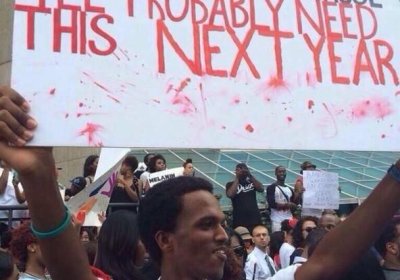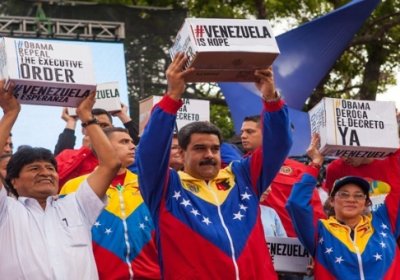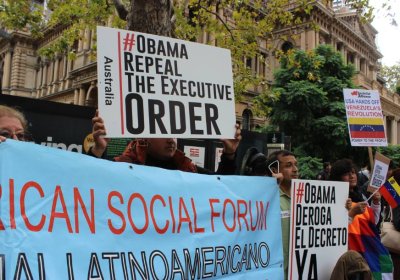 A lot is at stake in Turkey’s parliamentary elections to be held on June 7 — for the ruling Justice and Development Party (AKP) as well as the oppressed Kurdish population.
The AKP, led by President Recep Tayyip Erdogan, won 49% of the vote in the 2011 elections and holds 312 of the 550 seats in Turkey’s Grand National Assembly. A Gezici poll taken in January suggests the AKP’s support has slipped 9.7% to just under 40%.
A lot is at stake in Turkey’s parliamentary elections to be held on June 7 — for the ruling Justice and Development Party (AKP) as well as the oppressed Kurdish population.
The AKP, led by President Recep Tayyip Erdogan, won 49% of the vote in the 2011 elections and holds 312 of the 550 seats in Turkey’s Grand National Assembly. A Gezici poll taken in January suggests the AKP’s support has slipped 9.7% to just under 40%.
Democracy
 A lot is at stake in Turkey’s parliamentary elections to be held on June 7 — for the ruling Justice and Development Party (AKP) as well as the oppressed Kurdish population.
The AKP, led by President Recep Tayyip Erdogan, won 49% of the vote in the 2011 elections and holds 312 of the 550 seats in Turkey’s Grand National Assembly. A Gezici poll taken in January suggests the AKP’s support has slipped 9.7% to just under 40%.
A lot is at stake in Turkey’s parliamentary elections to be held on June 7 — for the ruling Justice and Development Party (AKP) as well as the oppressed Kurdish population.
The AKP, led by President Recep Tayyip Erdogan, won 49% of the vote in the 2011 elections and holds 312 of the 550 seats in Turkey’s Grand National Assembly. A Gezici poll taken in January suggests the AKP’s support has slipped 9.7% to just under 40%.
There is a tense stand-off right now between Greece's government and the so-called troika — the European Commission, the European Central Bank (ECB), and the International Monetary Fund (IMF). ECB President Mario Draghi recently went so far as to deny that his institution was trying to blackmail Greece's left-wing anti-austerity government.
But blackmail is actually an understatement. It has become increasingly clear that the troika is trying to harm the Greek economy in order to raise pressure on the new Greek government to agree to its demands.
The Inconvenient Genocide: Who Remembers the Armenians?
Geoffrey Robertson QC, Vintage Books,
Sydney, 294 pages, 2014
On the eve of Nazi Germany’s 1939 invasion of Poland, Adolf Hitler urged his generals “to kill without mercy men, women and children of the Polish race or language”.
“Only in such a way will we win [what] we need,” Hitler said. “Who, after all, speaks today of the annihilation of the Armenians.”
The Nazi leader was referring to the genocide carried out by the Ottoman Turkish empire in 1915 against the Armenian people within its borders.
Hundreds of protesters took to the streets of Indiana state capital Indianapolis on April 4 to demand legal protection against workplace discrimination based on sexual orientation.
“No hate in our state,” read placards carried by protesters. They marched through the city just days after state legislators revised a controversial religious freedom law that failed to provide protection against discrimination.
A new police murder of an unarmed Black man in the United States has received global attention. It comes as the #BlackLivesMatter movement has swept the country since the police murder of an unarmed Black teenager in Ferguson, Missouri last August.
On April 4, officer Michael Slager in North Charleston, South Carolina, shot 50-year-old Walter Scott in the back as he was fleeing.
The police initially tried to whitewash the incident, with the all-too-familiar assertion that Slager was assaulted by Scott and feared for his life. So the killing was justified. Q.E.D.
Venezuelan President Nicolas Maduro, along with his Bolivian counterpart Evo Morales, received a petition with 10 million signatures against U.S. President Barack Obama's executive order labelling the country as a “security treat” on April 9.
After the decree was issued, Maduro launched a campaign seeking 10 million signatures from Venezuelans demanding the decree be repealed, saying he would present them to the U.S. President Barack Obama at the April 10-11 Summit of the Americas in Panama.
US President Barack Obama admitted on April 9 that Venezuela “does not pose a threat” to the United States.
“We do not believe that Venezuela poses a threat to the United States, nor does the United States threaten the Venezuelan government,” Obama said during an interview with EFE.
Last month, Obama signed an executive order declaring Venezuela an “unusual and extraordinary threat to the national security and foreign policy of the United States.”
Within two months of the cliff-hanger election that resulted in the ALP forming a minority government, what seems like a re-run of the attempts to unseat the Julia Gillard government in Canberra is playing out in Queensland.
Despite pressure from the Labor and Liberal parties to resign his seat, in a statement issued on April 8, the former ALP, now independent, MP for Cook, Billy Gordon confirmed that he will not resign from parliament but will continue to represent his constituents.
This statement was released by Billy Gordon on April 8.
***
Last week I resigned from the Australian Labor Party. I will not resign from parliament.
My decision is based on advice from the clerk of parliament, who gave detailed reasons why I did not have to resign over past events and allegations. I am also determined to honour my commitments to my constituents.
During the election campaign I committed to tackling entrenched social and economic problems in Cook and helping communities seize economic development opportunities.
About 150 people filled the St Kilda Town Hall on April 7 for a public meeting with visiting Israeli journalist, Amira Hass. Hass is a veteran Israeli columnist and reporter, lives in the West Bank among Palestinians and works for Israeli newspaper Haaretz.
The Australian Jewish Democratic Society organised the forum.
Sydney Staff for Boycott Divestment and Sanctions sent this open letter to University of Sydney vice-chancellor Michael Spence on March 25. The letter is in response to Spence’s email of March 19, in which he claimed anti-Semitism was the trigger for the university’s investigation into the student protest at the March 11 lecture by Colonel Richard Kemp and its sequel.
* * *
We are compelled to write to you to register our serious concern about the concerted campaign being conducted against Palestine activists at the University of Sydney.
In the early hours of the morning on April 7, the Malaysian parliament reintroduced powers of indefinite detention without trial in the form of a new Prevention of Terrorism Act (POTA). Such powers, previously under the Internal Security Act and Emergency Ordinance — which were repealed in 2012 under popular pressure — have a notorious history of being used by British colonial and, after independence, Malaysian authorities to detain political dissidents.
- Previous page
- Page 312
- Next page










